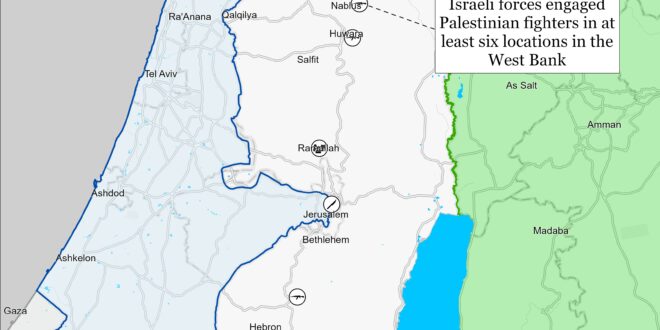Russia and China are hosting talks to facilitate Hamas’ inclusion in the Palestinian Authority, which would result in a Hamas-influenced government in the West Bank and the Gaza Strip. China hosted senior Hamas and Fatah officials in Beijing on April 26 to discuss “intra-Palestinian reconciliation” and to “strive for the early realization of Palestinian unity and reunification.”[i] Russia also facilitated Hamas-Fatah talks in February 2024 that sought to achieve “Palestinian unity.”[ii] An unspecified Palestinian official told the New York Times that senior Hamas official Musa Abu Marzouk and Fatah Central Committee member Azzam al Ahmad participated in the China-hosted talks.[iii]
Both the Chinese and the Russian efforts to achieve “Palestinian unity” mirrors a plan laid out by Hamas Political Bureau Chairman Ismail Haniyeh on April 21 that called for a “consensus government.” Haniyeh set out a framework on April 21 for Palestinian governance that would require the Palestinian Liberation Organization (PLO) to include Hamas and Palestinian Islamic Jihad in its leadership and for Palestinian political factions to form a consensus government that unifies the West Bank and the Gaza Strip.[iv] A consensus government would be influenced by Hamas and PIJ in both the West Bank and Gaza. This influence could allow both groups to help facilitate the smuggling of weapons and other military supplies into the West Bank. Hamas—after gaining control over the Palestinian Authority government in the 2006 Palestinian Elections—subsequently undermined Fatah’s security forces and executed a military takeover of the Gaza Strip in 2007.[v] Fatah is unlikely to agree to a reconciliation agreement with Hamas in any case, given lack of trust between the two sides stemming from the 2007 Hamas takeover of the Gaza Strip and several subsequent failed attempts at reconciliation.
Israeli political and military officials suggested that an Israeli clearing operation into Rafah could begin within the next few days. Unspecified security officials told Israeli Army Radio that the operation into Rafah will begin if Hamas does not accept the current Egyptian ceasefire proposal.[vi] Other Israeli media sites circulated unsourced reports on April 29 that the IDF would begin an operation into Rafah in the next two to three days if a hostage deal is not reached.[vii] An unspecified Israeli official told Agence France-Presse on April 30 that Israel would wait until May 1 for Hamas’ response to the proposal.[viii] Israeli Prime Minister Benjamin Netanyahu stated during a meeting with the families of hostages held in the Gaza Strip that the IDF “will enter Rafah and eliminate the Hamas battalions there—with or without a deal.”[ix] A family member that attended the meeting said that they understood from Netanyahu’s comments that “it is not a question of whether Rafah is or is not going to happen.”[x] Far-right minister Itamar Ben Gvir similarly said on April 30 that Netanyahu “promised [in a private meeting] that Israel would go into Rafah” and that there would not be a “reckless” ceasefire deal.[xi] Ben Gvir “warned” Netanyahu of the consequences of failing to clear Rafah during the meeting.[xii] Finance Minister Bezal Smotrich, a far-right ally of Ben Gvir, threatened Netanyahu on April 29 that “a government headed by you will have no right to exist” if it failed to defeat Hamas.[xiii]
The IDF indicated on April 30 that two divisions are ready for a ground operation into Rafah. The IDF said on April 30 that the 162nd and 98th divisions “completed combat readiness operations” and their commanders approved operational plans for future operations in the Gaza Strip.[xiv] Both divisions have conducted combat operations in the Gaza Strip since October 27. Israeli media claimed on April 29 that IDF armor is “lined up on the Gaza Strip border” and ready to begin the offensive into Rafah.[xv] IDF Chief of Staff Herzi Halevi approved operational plans “for the continuation of the war”—presumably including an operation into Rafah—during meetings at IDF Southern Command on April 28.[xvi]
Netanyahu also confirmed on April 30 that the IDF had begun the humanitarian evacuation of Rafah.[xvii] The IDF expanded its humanitarian zone in the southern Gaza Strip on April 28.[xviii] Israeli Defense Minister Yoav Gallant said on April 15 that Israel would evacuate Rafah before beginning clearing operations there.[xix] A senior United Nations official told the Wall Street Journal that a civilian evacuation from Rafah to other parts of Gaza would take at least 10 days.[xx]
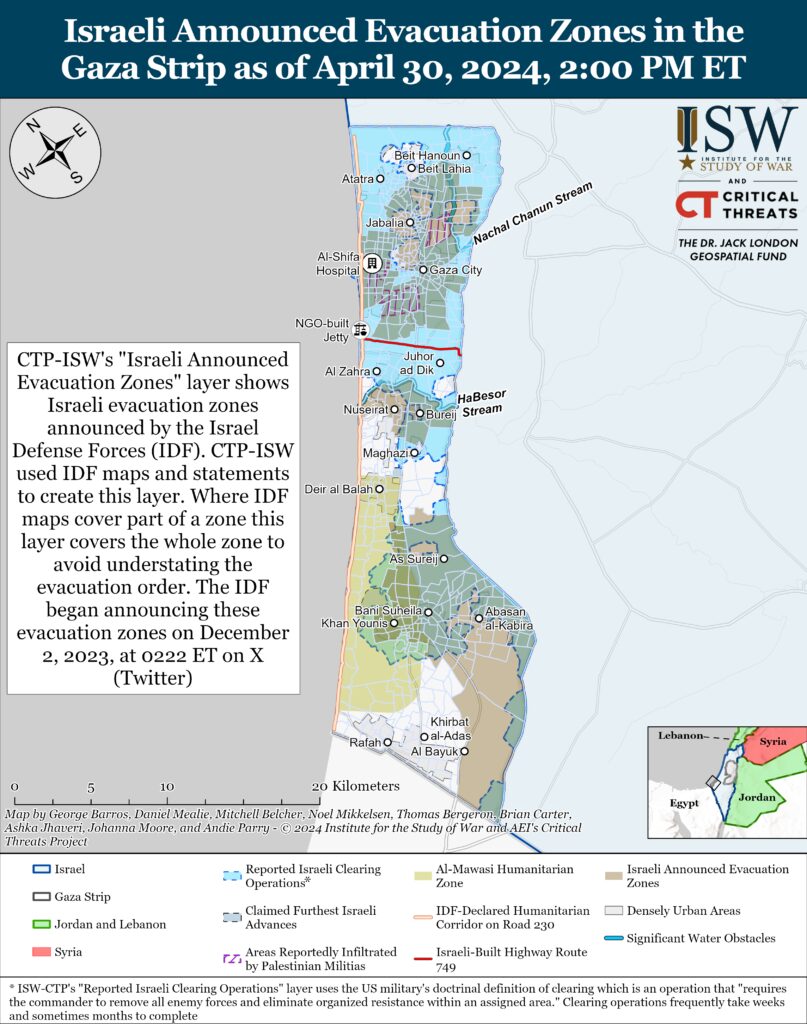
Hamas is continuing to consider an Egyptian ceasefire proposal that could enact a ceasefire in the Gaza Strip of up to a year.[xxi] Egyptian sources told the Wall Street Journal that Hamas would need to release at least 20 living hostages before the second phase of the deal, which includes a year-long ”sustained calm.”[xxii] Hamas delegates in Cairo reportedly said that the proposal currently fails to provide clear guarantees that Israel is serious about the second phase of the deal.[xxiii] A senior Hamas official speaking to a UK-based, Qatari-owned outlet said that Hamas leadership abroad and Hamas leadership in Gaza have been in communication about the ceasefire proposal and are ”preparing the final response.”[xxiv] The Hamas official noted that Hamas, Palestinian Islamic Jihad (PIJ) and other Palestinians factions fighting in the Gaza Strip are contributing to the response. Hamas is the leader of a 12-militia coalition that coordinates politically and militarily.[xxv] PIJ Deputy Secretary General Muhammad al Hindi told Hamas-affiliated Quds News on April 29 that the Palestinian factions had discussed the ceasefire and that Hamas’ demands of an Israeli withdrawal and a full ceasefire “are clear.”[xxvi]
A BBC report published on April 29 detailed the uncoordinated and brutal way in which Iranian security personnel killed a 16-year-old girl participating in the 2022 protest wave, citing a “highly confidential” IRGC document.[xxvii] The BBC identified the document as a report summarizing a five-hour, IRGC-held hearing on the killing of Nika Shakarami, a 16-year-old girl. The document confirmed that three members of Ansar-e Hezbollah—a semi-official, regime vigilante group—molested and killed Shakarami for participating in the Woman, Life, Freedom movement in September 2022. The report claimed that the personnel detained, abused, and killed Shakarami in their vehicle after spotting her at an anti-regime protest. IRGC Capt. Mohammad Zamani instructed the team to dump Shakarami’s deceased body on a Tehran street to avoid mounting casualties recorded at security stations. Zamani said that he had “already had deaths in [his] station, and [he did not] want the number to rise to 20.“ This statement illustrates the culpability of this IRGC officer and his entire chain of command in Shakarami’s death. The regime later claimed that Shakarami killed herself.[xxviii] The regime frequently disposed of dead protestors or delayed family access to the bodies of dead protesters during the Mahsa Amini movement.[xxix]
A senior former Iranian intelligence officer helped the BBC verify the authenticity of the report. The BBC offered details about how this official corroborated the document such as checking an IRGC archive by using a daily code issued to senior intelligence officers. The individual also called an Iranian government official within Iran’s military apparatus to authenticate the report.[xxx]
This report corroborates some of CTP’s assessments made during its coverage of the Mahsa Amini movement, including that the protests caused security bandwidth constraints, exhaustion, and low morale.[xxxi] The report cited by the BBC suggests an extraordinary level of incompetence from security personnel, including that Iranian security forces feared Shakarami and 14 other female protesters’ potential to ”cause a [prison] riot.”[xxxii] Ansar-e Hezbollah’s participation in protest suppression also suggests that the regime was facing bandwidth constraints due to the protests. The IRGC uses and works with Ansar-e Hezbollah members, although the group sometimes operates outside of the IRGC’s jurisdiction in an extra-legal capacity.[xxxiii] Ansar-e Hezbollah has previously threatened, kidnapped, and killed regime dissidents but has not played a prominent role in quashing anti-regime protests in recent years.[xxxiv] The group’s participation in suppressing the Mahsa Amini protest movement is particularly noteworthy within this context.
The BBC’s April 29 report further highlights CTP’s long-standing observation that the regime enables and empowers the killing of its citizens.[xxxv] The IRGC document stated that Shakarami’s killing did not result in disciplinary action because the incident involved the participation of Ansar-e Hezbollah members instead of IRGC officers. The IRGC officer who oversaw the Ansar-e Hezbollah members and instructed them to dump Shakarami’s body received only a “written reprimand.”[xxxvi]
Increased instability and anti-regime militancy in eastern Iran are driving a change in the Iranian regime’s calculus and prioritization of threats along its eastern border. Jaish al Adl—a Baloch, Salafi-jihadi group—has conducted a series of attacks targeting Iranian security services in Sistan and Baluchistan Province, Iran, since December 2023, including a major complex attack on April 14.[xxxvii] The Afghan branch of the Islamic State has also conducted several major attacks in Iran since October 2022, including a double suicide vest attack targeting an event in January 2024 commemorating the death of Qassem Soleimani.[xxxviii] Iran has responded to these events by employing new capabilities and investing substantial resources to address the increasingly tenuous security environment along its eastern border. Iran used drones to target a vehicle carrying “anti-Iran militants” in Sistan and Baluchistan Province on April 25.[xxxix] The use of a drone to target these fighters is unprecedented, suggesting that the Iranian regime is increasing the number of resources it is devoting to fighting militancy in southeastern Iran. Iran announced two days later that it would fund a $3 billion border wall along Iran’s northeastern border with Afghanistan, which presumably includes the northernmost section of Sistan and Baluchistan Province.[xl] This wall is unlikely to be effective, given its length and the fact that it will not extend along the Pakistani border. The Iranian decision to devote resources towards building the wall does indicate the increasing priority Iran’s regime is giving to the security situation in southeastern Iran, however.
The regime’s recent and historical mistreatment of the Sunni Baloch population inside Sistan and Baluchistan Province has further exacerbated these security challenges. Iranian security forces violently suppressed Sunni Baloch protesters in Zahedan, Sistan and Baluchistan province in September 2022 in an event that became known as “Bloody Friday.”[xli] This mistreatment provides fertile ground for groups like Jaish al Adl to recruit fighters and benefit from tacit support, further limiting the effectiveness of the planned border wall. Jaish al Adl vowed in early October 2022 that it would retaliate against the Iranian regime for killing protesters and “enter the field with all its power.”[xlii] Prominent Sunni cleric Moulana Abdol Hamid severely criticized the regime during his weekly Friday Prayer sermons and led Zahedan residents in anti-regime protests on a weekly basis after the “Bloody Friday” incident.[xliii] The regime’s negligent development of resources and infrastructure in the province has left it critically underdeveloped, which has long fueled anti-regime sentiment and protest among the Balochi population.[xliv] Separatist Balochi militant organizations have long sought to separate Sistan and Baluchistan Province from Iran in response to these perceived grievances.[xlv]
Iran is also pursuing diplomatic measures to counteract the increasing threat on Iran’s southeastern border with Pakistan. Iranian President Ebrahim Raisi discussed regional instability and other matters with various senior Pakistani officials including the Pakistani Chief of Army Staff Gen. Asim Munir on April 23-25.[xlvi] Raisi and Munir also discussed increasing cooperation between the Iranian and Pakistani armed forces.[xlvii] Raisi’s trip to Pakistan illustrated Iran’s diplomatic efforts to respond to a real and perceived threat change.
Key Takeaways:
- Fatah-Hamas Meeting in China: Russia and China are pursuing Hamas’ inclusion in the Palestinian Authority, which would result in a Hamas-influenced government in the West Bank and the Gaza Strip. Russia and China’s pursuit of “Palestinian unity” mirrors a plan laid out by Hamas Political Bureau Chairman Ismail Haniyeh on April 21 that called for a “consensus government.”
- Rafah: An Israeli clearing operation into Rafah could begin within the next few days. The IDF indicated on April 30 that two divisions are ready for a ground operation into Rafah.
- Ceasefire Negotiations: Hamas is considering an Egyptian proposal that offers a year-long ceasefire if Hamas releases at least 20 hostages alive.
- Iran: Leaked IRGC documents analyzed by the BBC detailed the uncoordinated and brutal way in which Iranian security personnel abused and killed a 16-year-old girl during the 2022 protest wave. The IRGC’s subsequent cover-up of the killing demonstrates that the regime is culpable for her death.
- Militancy in Southeastern Iran: Increased anti-regime militancy in eastern Iran is driving a change in how the regime prioritizes threats along its eastern border.
- Humanitarian Aid in Gaza: The US military began constructing the floating pier off the coast of the Gaza Strip sometime in late April. US CENTCOM published photos of the construction on April 29.
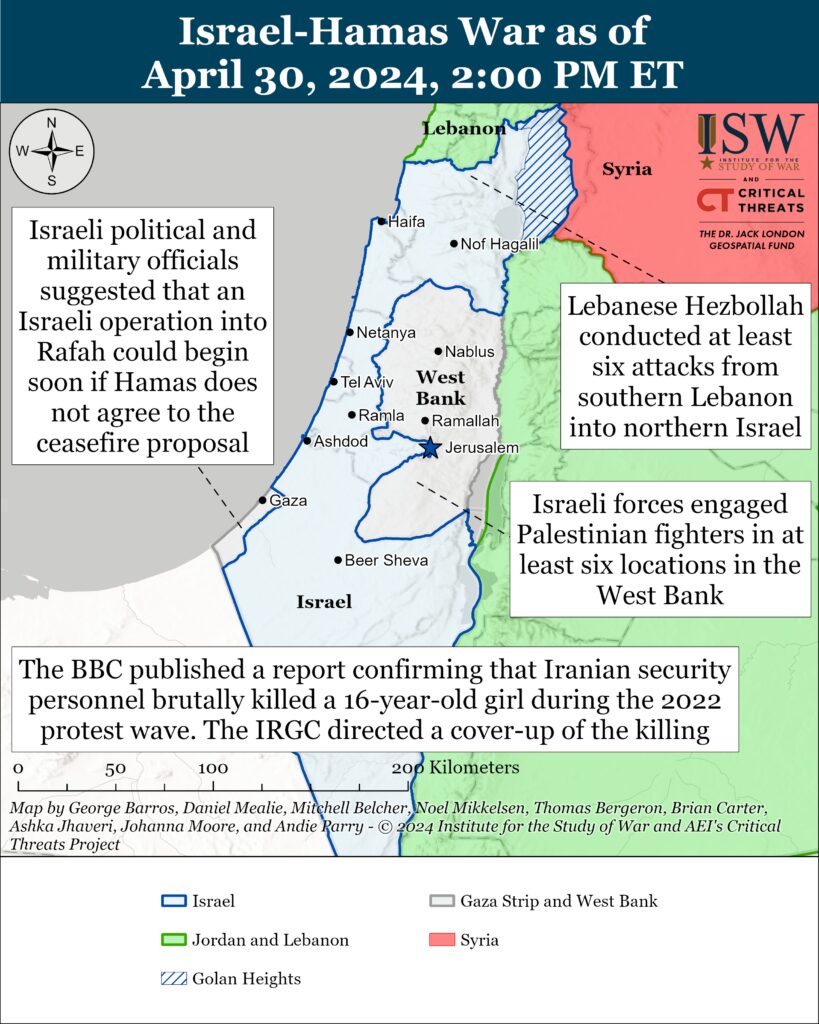
Gaza Strip
Axis of Resistance objectives:
Erode the will of the Israeli political establishment and public to sustain clearing operations in the Gaza Strip
Reestablish Hamas as the governing authority in the Gaza StripThe Israel Defense Forces (IDF) continued to target Palestinian fighters and militia infrastructure across the Gaza Strip on April 30. The IDF 99th Division directed airstrikes targeting a Palestinian weapons warehouse and Palestinian fighters approaching Israeli forces in the central Gaza Strip.[xlviii] The IDF Air Force also struck tunnel shafts, rocket and anti-tank guided missile launch sites and other military infrastructure in the northern Gaza Strip.[xlix] The IDF Air Force struck these targets in an area that Palestinian Islamic Jihad (PIJ) fighters had used to launch a rocket targeting Sderot just prior to the strike.[l] The IDF 679th Armored Reserve Brigade continued operations in the central Gaza Strip.[li]
Palestinian fighters claimed a single attack targeting Israeli forces in the Gaza Strip on April 30. PIJ mortared an Israeli base along the Netzarim corridor.[lii] Palestinian militias have claimed almost daily indirect fire attacks targeting Israeli forces near the Netzarim corridor since April 18.[liii]
Al Jazeera aired footage produced by Hamas purporting to demonstrate a new Hamas bounding mine.[liv] Bounding mines use a small charge to propel themselves a few feet into the air before detonating and spraying shrapnel outwards.[lv] The weapon has a similar tactical application to anti-personnel mines. The Hamas promotional video contained scenes of Hamas fighters testing the mine buried and stuck to Israeli tanks.[lvi]
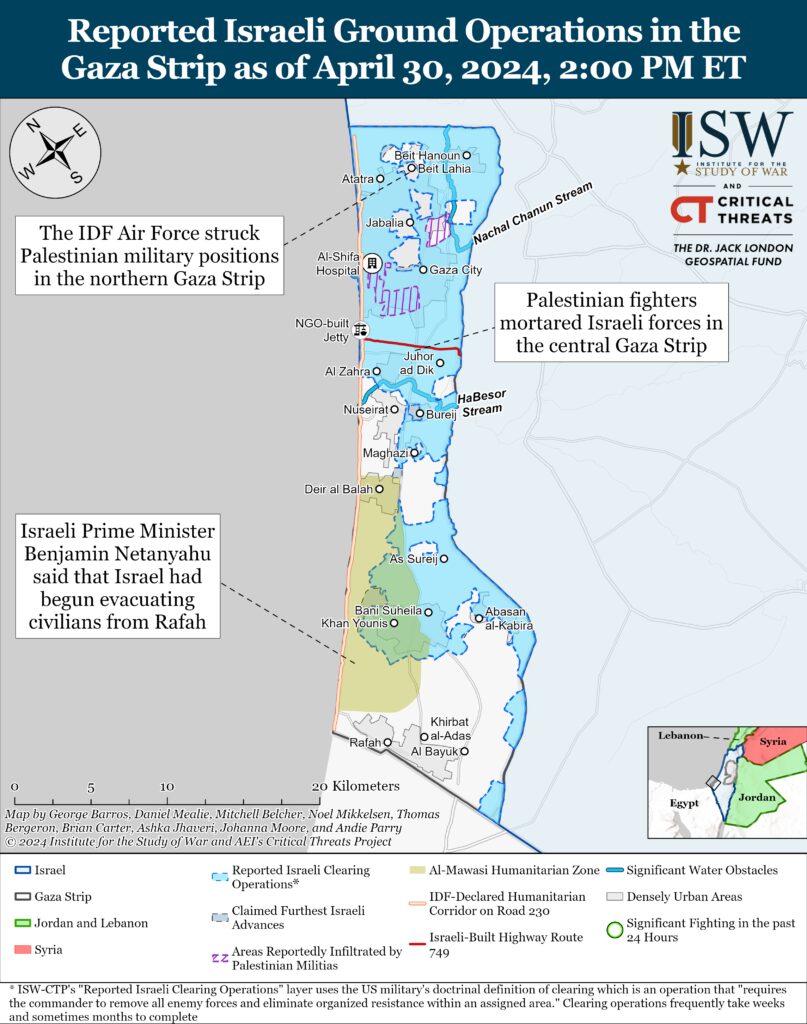
The US military began constructing the floating pier off the coast of the Gaza Strip sometime in late April. US CENTCOM published photos of the construction on April 29.[lvii] Commercially available satellite imagery captured on April 29 shows the USNS Benavidez and the floating pier approximately 11 kilometers off the coast of the central Gaza Strip. This distance is outside 81mm and 120mm mortar range. A Defense Department spokesperson said that the pier is on track to be completed by “early May.”[lviii] US Secretary of State Antony Blinken is scheduled to visit Ashdod Port and Kerem Shalom crossing on May 1 to inspect the advances Israel has made to get humanitarian aid into the Gaza Strip.[lix]
West Bank
Axis of Resistance objectives:
Establish the West Bank as a viable front against IsraelIsraeli forces have engaged Palestinian fighters in at least six locations in the West Bank since CTP-ISW’s last information cutoff on April 29.[lx] PIJ’s Nablus Battalion shot at Israeli forces operating in Askar camp, east of Nablus, on April 29.[lxi] Al Aqsa Martyrs’ Brigades “special unit” shot at Israeli forces at the Sanuz checkpoint in Tulkarm.[lxii]
A Turkish national stabbed two Israeli security forces officers near Herod’s Gate, Jerusalem on April 30.[lxiii] The attacker wounded one officer in the attack. The two Israeli officers shot and killed the attacker. Unspecified Israeli defense officials claimed that the man entered Israel on a tourist visa.[lxiv] The Palestinian Mujahideen Movement applauded the stabbing and called on Palestinian civilians to conduct similar attacks.[lxv]
Palestinian media reported that unidentified Palestinian fighters rammed an IDF officer with their vehicle near Bartaa in Jenin Governorate.[lxvi]
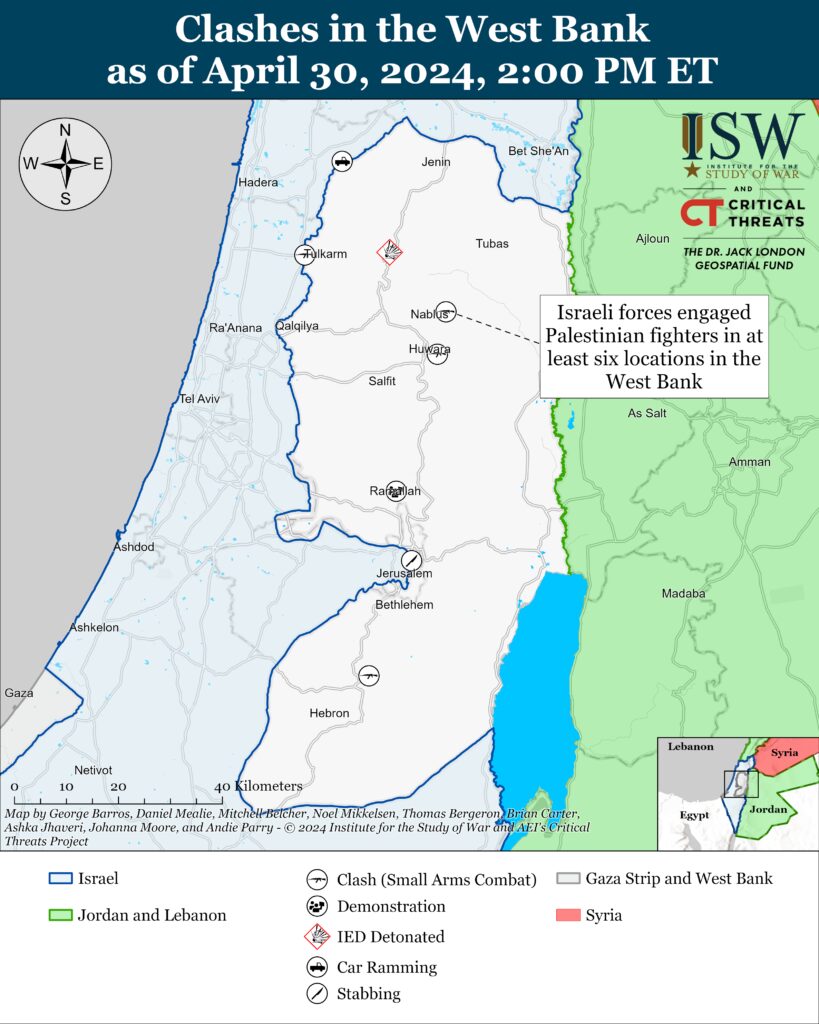
This map is not an exhaustive depiction of clashes and demonstrations in the West Bank.
Southern Lebanon and Golan Heights
Axis of Resistance objectives:
Deter Israel from conducting a ground operation into Lebanon
Prepare for an expanded and protracted conflict with Israel in the near term
Expel the United States from SyriaLebanese Hezbollah has conducted at least six attacks from southern Lebanon into northern Israel since CTP-ISW’s last data cutoff on April 29.[lxvii] Hezbollah conducted three attacks targeting Israeli forces in Metulla.[lxviii] Hezbollah claimed that the attacks destroyed two buildings and caused multiple IDF casualties. The IDF confirmed that six anti-tank missiles were fired from southern Lebanon towards Metulla and damaged a building.[lxix]
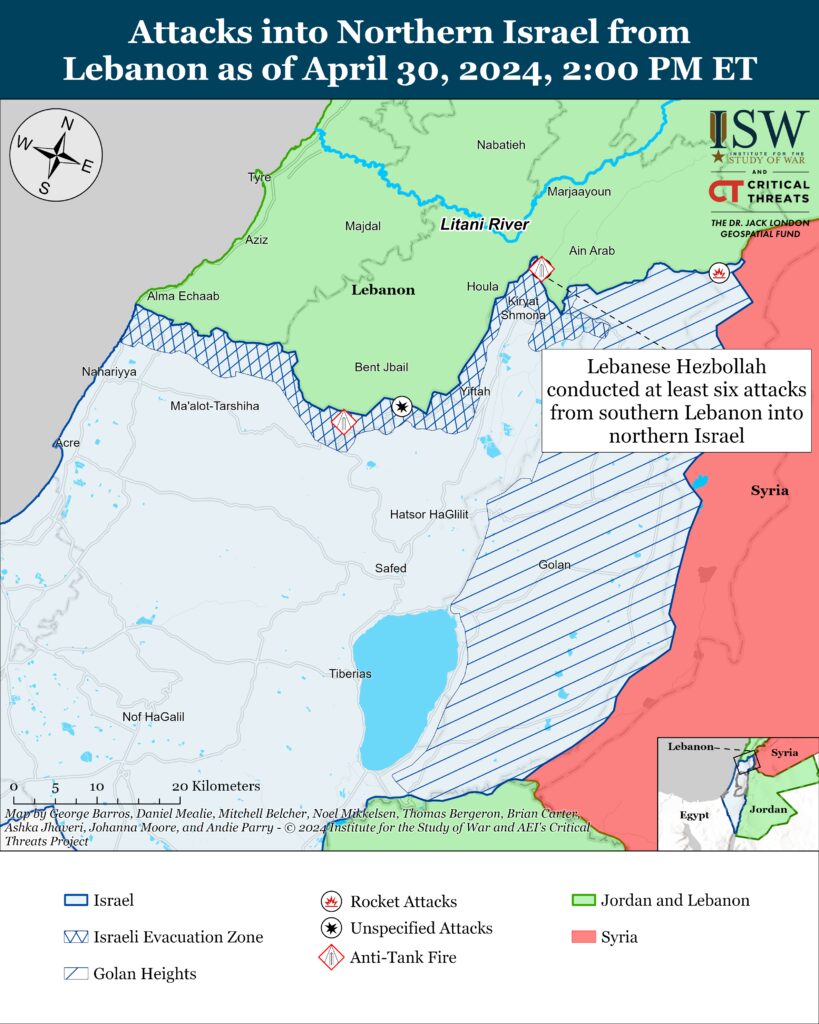
Recorded reports of attacks; CTP-ISW cannot independently verify impact.
Iran and Axis of Resistance
An anti-regime journalist claimed without further evidence that Israel killed an IRGC officer in Iran on April 29.[lxx] The correspondent claimed the IRGC officer played a role in attacks on Jewish centers in Germany. Israeli media reposted this unverified claim.[lxxi] CTP-ISW cannot independently verify this claim.
Iraqi Sunni Taqqadum Party (National Progress Party) member Anwar al Alwani suggested that the Taqqadum Party would be forced to withdraw from Iraqi politics if its preferred candidate is not nominated as Parliament Speaker.[lxxii] National Progress Party member Anwar al Alwani claimed that selecting a Parliamentary speaker from a Sunni party that does not hold the majority of Sunni seats in parliament would break with agreed political standards and customs to select the speaker from the majority Sunni party. Halbousi’s National Progress Party holds 43 seats in the Iraqi Parliament.[lxxiii] The al Azm Alliance spokesperson claimed on April 29 that Sunni parties have agreed to support Sovereignty Alliance member Salem al Issawi as Iraqi parliament speaker.[lxxiv] The Sovereignty Alliance is headed by US-sanctioned and Iran-linked businessman Khamis al Khanjar.[lxxv] The Sovereignty and Azm Alliance are both Sunni political parties. The Iraqi parliament has been led by Kurdish Shia interim speaker Mohsen al Mandalawi since November 2023 when the Iraqi Federal Supreme Court illegally removed Halbousi from office.[lxxvi]
The Houthis likely targeted a Portuguese-flagged merchant vessel southeast of Socotra, Yemen with a one-way attack drone on April 26.[lxxvii] The MSC Orion crew discovered drone debris onboard the vessel and reported minor damage.[lxxviii] The MSC Orion is partly owned by Israeli billionaire Eyal Ofer.[lxxix] The Joint Maritime Information Center (JMIC) suggested that the merchant vessel was likely targeted due to an unspecified affiliation with Israel. The Houthi movement claimed that its fighters targeted the MSC Orion in the Indian Ocean with “numerous drones” on April 29.[lxxx]
United States Central Command (CENTCOM) reported that the Houthis fired three anti-ship ballistic missiles and three UAVs from Houthi-controlled territory towards Malta-flagged, Greek-owned MV Cyclades on April 29.[lxxxi] Initial reports indicated there were no injuries and the vessel continued its journey uninterrupted. CENTCOM separately destroyed one Houthi-launched drone targeting the USS Philippine Sea and the USS Laboon in the Red Sea. CENTCOM reported no injuries or damage to US, coalition, or merchant vessels. CTP-ISW previously reported an explosion near the MV Cyclades on April 29.[lxxxii]
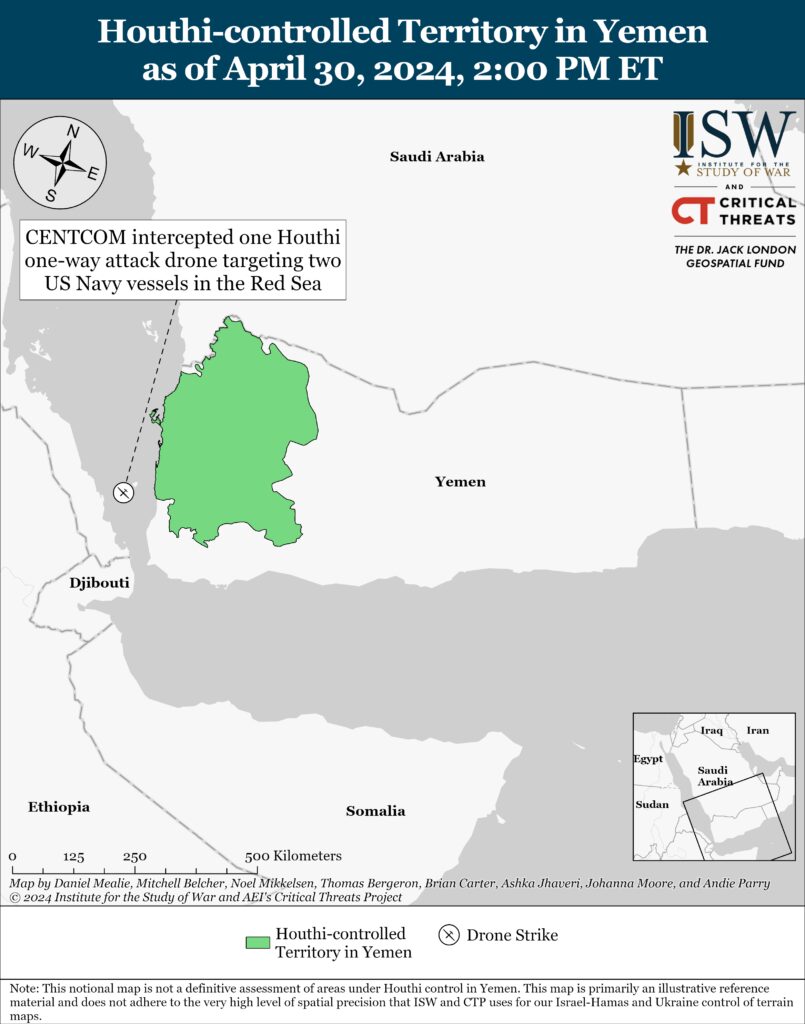
 Eurasia Press & News
Eurasia Press & News
